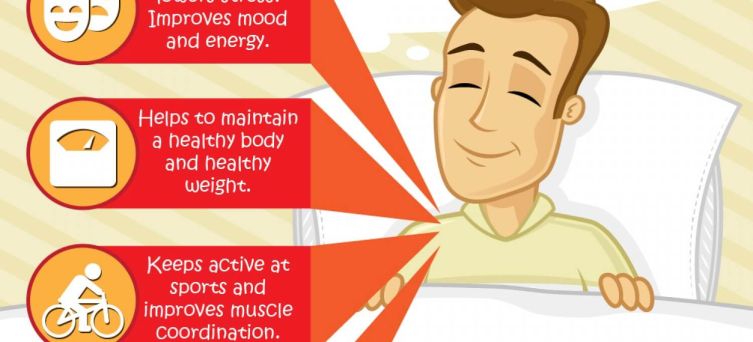“A good laugh and a long sleep are the best cures in the doctor’s book.” ~Irish Proverb
Waking up feeling refreshed is one of the best feelings, one can enjoy. We certainly feel more alert, more energetic, happier and are able to function better, all day long, following a good night of sound sleep. Throughout life, from infancy to the golden years, sleep is important for maintenance of good health and well-being. While you’re sleeping, your brain is preparing for the next day, so that you are fully alert while performing your daily activities, such as reading this article. Let’s see below, how sleep benefits us, how much sleep is ideal for us & consequences of sleep disturbances on one’s health.
The way you feel while you’re awake depends in part on what happens while you’re sleeping. During sleep, your body is working to support healthy brain function and maintain your physical health. In children and teens, sleep also helps support growth and development. Getting enough quality sleep at the right times can help protect your mental health, physical health, quality of life, and safety.
How much sleep is adequate sleep? Although the quantum of sleep required varies as per one’s age (Refer Table 1) and level of activity pursued, on an average 7-8 hours of sleep at night is considered adequate for adults.
Table 1: Recommended Amount of Sleep for Different Age Groups
| Age | Recommended Amount of Sleep |
| Newborns | 16-18 hours a day |
| Preschool-aged children | 11-12 hours a day |
| School-aged children | At least 10 hours a day |
| Teens | 9-10 hours a day |
| Adults (including the elderly) | 7-8 hours a day |
Unfortunately, the hectic lifestyle of modern day living has lead to sleep deficiency across all age groups. Sleep often is the first thing that busy people squeeze out of their schedules. The high prevalence of sleep restriction is a matter of global concern, and many potential reasons for the same have been identified. The demands of today’s 24*7 hour society, including long work hours and rotating night shift work, can lead to sleep restriction. Family needs and domestic chores can also result in sleep restriction. Increased time spent watching television, browsing the Internet, connecting on social-media sites, etc reduces the time available for sleep. Some individuals suffer from a medical condition called insomnia, characterized by an inability to fall asleep or stay asleep.
A common myth is that people can learn to get by on little sleep with no negative effects. However, research shows that getting enough quality sleep at the right times is vital for mental health, physical health, quality of life, and safety.
Sleep deficiency can interfere with work, school, driving, social functioning and much more. You might have trouble learning, focusing, and reacting. Children who are sleep deficient might be overly active and have problems paying attention. They also might misbehave, and their school performance can suffer. Sleep deficient individuals also might find it hard to judge other people’s emotions and reactions. Sleep deficiency also can make you feel frustrated, cranky, or worried in social situations. Sleep deficiency is linked to many chronic health problems, including heart disease, kidney disease, high blood pressure, diabetes, stroke, obesity, and depression. Sleep deficiency is also associated with an increased risk of injury in adults, teens, and children, as they are not alert to the circumstances around them and fall asleep while driving, operating machinery, etc which can prove to be fatal.
If you are worried about whether you are getting enough sleep, try using a sleep diary for a couple of weeks. Write down how much you sleep each night, how alert and rested you feel in the morning, and how sleepy you feel during the day. Show the results to your doctor and talk about how you can improve your sleep. If your job or daily routine limits your ability to get enough sleep or sleep at the right times, talk with your doctor. You also should talk with your doctor if you sleep more than 8 hours a night, but don’t feel well rested. You may have a sleep disorder or other health problem.
You might be sleep deficient if you often feel like you could doze off while sitting and reading or watching TV, sitting still in a public place, such as a movie theatre, meeting, or classroom or while riding in a car for an hour without stopping, while sitting and talking to someone or while sitting quietly after lunch.
By following a few good sleep habits, it is possible to ensure that you wake up feeling fresh day after day and are able to handle your day’s routine without feeling sleepy during the daytime. Try to go to bed and wake up at the same time every day, including wekends. Staying up late and sleeping in late on weekends can disrupt your body clock’s sleep–wake rhythm. Use the hour before going to bed for some quiet time. Keep your bedroom quiet, cool, and dim. Try to have a hot bath or use other relaxation techniques before going to bed. Avoid strenuous exercise and bright artificial light, such as from a TV or computer screen. Avoid heavy large meals, alcohol, nicotine, caffeine and other stimulants within a couple hours of bedtime.
In conclusion, sleeping is a basic human need, like eating, drinking, and breathing. Do get your daily dose of sound sleep and enjoy life, as it is meant to be.



 Previous
Previous









0 Comments